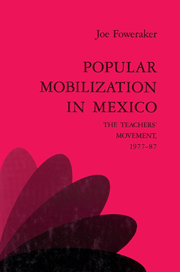Book contents
- Frontmatter
- Contents
- Preface
- Glossary of acronyms
- Introduction: The character and context of popular mobilization in contemporary Mexico
- PART I POPULAR MOVEMENT AND SYNDICAL STRUGGLE
- PART II INSIDE THE MOVEMENT IN CHIAPAS
- 4 Leadership and grass roots
- 5 Strategic choices
- 6 Factional strife
- PART III NATIONAL MOBILIZATION AND SYSTEM RESPONSES
- PART IV POPULAR MOVEMENTS AND POLITICAL CHANGE
- Bibliography
- Index
4 - Leadership and grass roots
Published online by Cambridge University Press: 29 September 2009
- Frontmatter
- Contents
- Preface
- Glossary of acronyms
- Introduction: The character and context of popular mobilization in contemporary Mexico
- PART I POPULAR MOVEMENT AND SYNDICAL STRUGGLE
- PART II INSIDE THE MOVEMENT IN CHIAPAS
- 4 Leadership and grass roots
- 5 Strategic choices
- 6 Factional strife
- PART III NATIONAL MOBILIZATION AND SYSTEM RESPONSES
- PART IV POPULAR MOVEMENTS AND POLITICAL CHANGE
- Bibliography
- Index
Summary
The struggle against the political control and corruption of charrismo was simultaneously a struggle for democratic principles and for mass participation in the syndical arena. Moreover, as the struggle itself could advance only through mobilization, such participation was never passive; on the contrary, it was always actively expressed through marches and meetings, campaigns and strikes (Trevino Carrillo 1984). This was seen as a virtue of the movement. It was right in principle that the teachers should achieve more power over their own lives, and this could only begin with respect for “the majority decisions taken by the base.” It was also right in practice because this was how the teachers themselves might progress politically, and it was often asserted (sometimes demagogically) that the real changes occurred first in the base and that “many of the ideas which have guided the movement are in fact ideas of the base” (Chispa Sindical, March 1978).
Once the teachers felt the power of a mobilized membership, they exulted in it. “The supervisors who were accustomed to kick the teachers around have had to think again and change their attitude when facing an organized base which insists on respect for its rights” (Consejo Central de Lucha del Magisterio Chiapaneco 1981). And the teachers knew that this “Unity, Organization and Consciousness” (Consejo Central de Lucha del Magisterio Chiapaneco 1980b) was critical in sustaining their gains. Whatever problems of discipline this base might create (such as the spontaneous occupation of the Ministry of Education building in Tuxtla in October 1979), this was seen as a small price to pay for the political and ideological advantage of a movement with no chiefs or caciques.
- Type
- Chapter
- Information
- Popular Mobilization in MexicoThe Teachers' Movement 1977–87, pp. 61 - 74Publisher: Cambridge University PressPrint publication year: 1993

